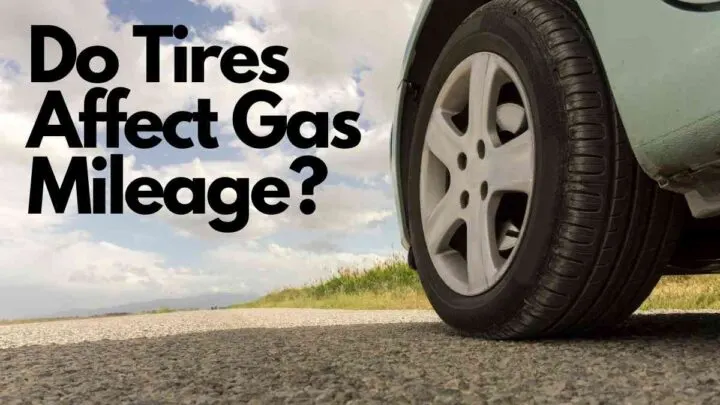While you know your tires are important in terms of helping give your car a smooth ride and gripping roads covered with snow or ice, you may be wondering if they also affect your gas mileage.
After all, if investing in more expensive tires will save you money in the long run, it may be worth upgrading the next time you need new tires.
But do tires affect gas mileage?
Larger tires generally weigh more than smaller tires, which decreases your vehicle’s fuel economy. They also have a larger surface area that contacts the road, increasing the road resistance and requiring your engine to work harder, which also decreases fuel efficiency. In general, smaller tires are more fuel-efficient than larger tires.
If you want to pick the best tires and save on gas mileage, here are some tips you may want to remember.
How Do Tires Affect Gas Mileage?
Since tires come in different sizes, this is a major way in which they impact your vehicle’s gas mileage.
If you drive a larger vehicle, such as a truck, SUV, or van, chances are the tires on your vehicle will be larger than those on a standard sedan or hatchback.
Because larger tires usually weigh more than smaller tires, the extra weight can decrease your vehicle’s fuel economy.
Since big tires weigh more than smaller tires, they have a much higher rolling resistance.
This means more effort and resistance are required in order to get these tires rolling.
However, if you are assuming that bigger tires always mean your vehicle will have less efficient gas mileage, that is not always the case.
Should you be a person who uses your vehicle with big tires for plenty of highway driving at higher speeds where you don’t have to stop much if any, it has been found that larger tires will actually result in better fuel efficiency!
Does Tire Pressure Impact Gas Mileage?
Whether a car’s tires are large or small, the amount of air in your tires can have a big impact on whether your car’s gas mileage is excellent or terrible.
When your tires are very low on air pressure, this results in them having more resistance. In other words, your car has to work harder to get your tires moving and keep them moving while on the road.
If you’ve ever tried to push a loaded-down wheelbarrow that has a flat tire, this is what your car is up against.
Though this problem is easily solved by keeping a sufficient amount of air in your tires, we recommend you don’t wait until your vehicle’s tire pressure + monitoring system alert you to a problem.
If you do, this will mean your tires are already at least 25 percent below where they need to be in terms of air pressure.
To maximize your car’s fuel mileage, we agree with the experts and suggest you check your tire pressure once per month.
Will a Tire’s Tread Increase or Decrease Fuel Mileage?
Along with being important in helping your car not slip and slide while on the road, tire tread also plays an important role in how often you need to stop by a gas station to fill up your tank.
When the tread on your tires is in excellent condition, this allows the tires to move more easily down the road, which means your car does not have to work as hard along the way.
If you’ve noticed, race cars tend to use tires that have no tread whatsoever. This is because tires with no tread offer little resistance, letting cars reach high speeds in a short period of time.
However, since your car is not on a race track, your tires need their tread to help you with braking, especially on slick roads.
Should you have a truck or SUV that you use for off-roading occasionally, it’s likely you have larger tires, which are also referred to as “chunky” tires.
While these are great for off-roading, it’s best if you don’t leave these on your vehicle all the time, especially if your vehicle spends most of its time on city streets and highways.
If you leave off-roading tires on your vehicle all the time, you will be spending more at the gas pump, since this combination results in lower gas mileage.
If you want to get better gas mileage and have your vehicle working less, install street tires when you know you won’t be off-roading.

Will New Tires Improve Fuel Mileage?
When you buy a new set of tires and install them on your vehicle, it is almost certain you will see an improvement in fuel mileage.
After a new set of all-season tires are installed on your vehicle, research shows the reduction in rolling resistance, sufficient air pressure, and new tread that grips the road will give you at least an additional two miles per gallon, and in some cases a bit more.
Though you may have to pay hundreds of dollars initially to purchase your tires and have them installed, you will recoup your investment over time by spending less on filling up your gas tank.
As long as you take care of your new tires in terms of maintaining air pressure and having them rotated regularly to ensure even tread wear, you should continue to notice an improvement in your vehicle’s gas mileage.
How Do Tires Impact My Car’s Engine?
When it comes to your car’s fuel mileage being good or bad, you may not realize much of this has to do with how your tires are impacting your car’s engine.
As an example, when you are driving around on tires that have worn-out tread, this makes your car’s engine have to work that much harder just to keep your vehicle going in the right direction.
With the additional strain on the engine, fuel efficiency is often sacrificed. When your tires are low on air pressure, this also impacts your engine and subsequently your car’s fuel efficiency.
When tires are low on air pressure, this means your vehicle’s weight is not being properly supported.
Again, this puts much more work on your engine, straining it to keep your car on the road.
Are Tires Really Fuel Efficient?
As the technology associated with creating tires has improved over the decades, more and more tire manufacturers are now creating tires that are made specifically to be very fuel-efficient.
In studies conducted by the National Research Council, tires that have a low rolling resistance reduce both fuel consumption and emissions.
Also, take note that these same studies determined that as much as 30 percent of any vehicle’s fuel consumption is directly related to its tires and the condition of those tires.
In fact, some studies have shown that buying fuel-efficient tires for your vehicle may save you as much as $500 in gas over the several years after you replace your tires. Needless to say, that extra $500 could be spent on plenty of things besides gas.
How Do I Maximize Fuel Efficiency with My Tires?
This is a question that gets asked very often.
We find that one of the biggest mistakes people make with their tires that results in decreased fuel mileage is not following their manufacturer’s recommendations.
Though it may be tempting to switch out the wheels on your vehicle for something else, this will almost always lead to a decrease in your fuel mileage.
To obtain the maximum fuel mileage for your vehicle, we recommend you stick with the tire size that is recommended in your car’s owner’s manual.
However, if you do decide to change your wheel and tire size, choosing an alloy wheel over a steel wheel helps to keep your fuel mileage in an acceptable range.
Since you don’t want to waste your money at the gas pump, take some time to give your tires the TLC they deserve.
By keeping them filled with air, tending to their tread, and opting for smaller tires when possible, your vehicle will reward you with improved fuel efficiency.
